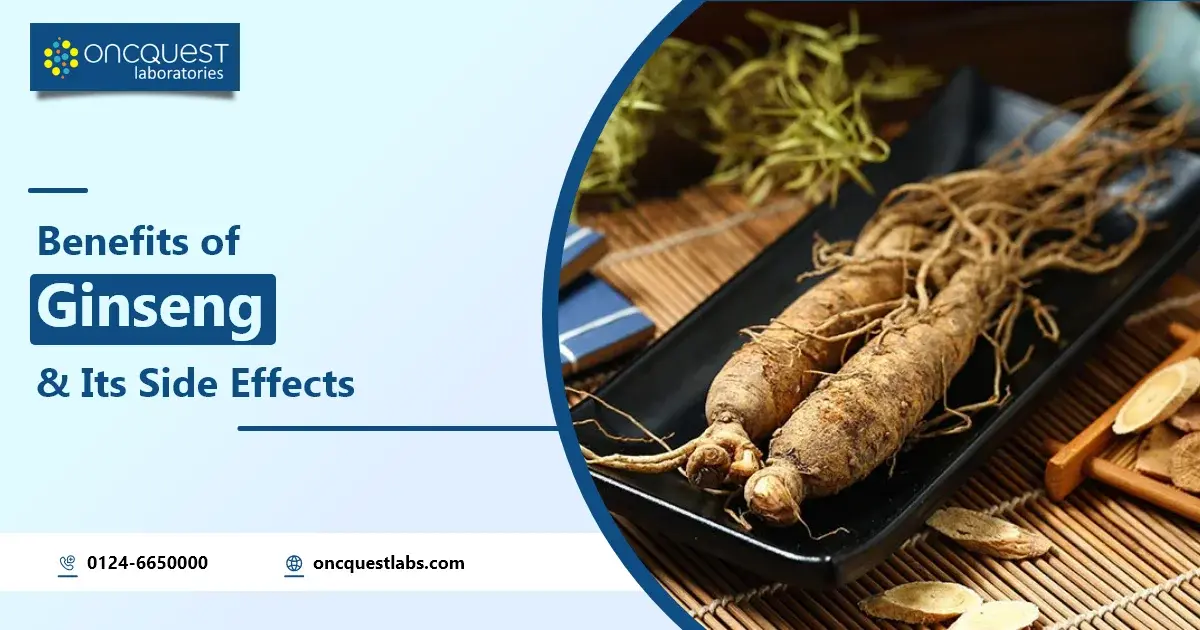Ginseng, a popular herbal remedy, has been used for centuries in traditional medicine, particularly in Asian cultures. Known for its potential to enhance well-being and treat various ailments, ginseng is often hailed as a wonder herb. However, like any supplement, it has its side effects. In this blog, we’ll explore the benefits of ginseng and its potential side effects, providing a comprehensive overview of this powerful herb.
Contents
What is Ginseng?
Ginseng is a slow-growing perennial plant with fleshy roots. The two most common types are Asian ginseng (Panax ginseng) and American ginseng (Panax quinquefolius). Both types are believed to offer health benefits, though they are thought to have slightly different properties. Asian ginseng is considered more stimulating, while American ginseng is thought to have a calming effect.
Ginseng is a well-known herbal remedy that has been used for centuries in traditional medicine, particularly in Asian cultures. It is prized for its potential health benefits and is commonly used to enhance well-being and treat various ailments. Here’s a detailed look at what ginseng is, its types, and its general uses.
Types of Ginseng
There are several types of ginseng, but the two most commonly used in herbal medicine are Asian ginseng and American ginseng. Each type is believed to offer distinct benefits.
- Asian Ginseng (Panax ginseng):
- Origin: Native to East Asia, particularly China, Korea, and Siberia.
- Properties: Known for its stimulating and invigorating effects. It is often used to boost energy, improve mental performance, and enhance physical stamina.
- Appearance: The root of Asian ginseng is usually long and slender, often with a yellowish hue.
- American Ginseng (Panax quinquefolius):
- Origin: Native to North America, primarily the United States and Canada.
- Properties: Considered to have a more calming and relaxing effect compared to Asian ginseng. It is often used to reduce stress, promote relaxation, and support the immune system.
- Appearance: The root of American ginseng is typically shorter and more bulbous, with a pale, whitish color.
Health Benefits of Ginseng
Boosts Energy Levels
Ginseng is renowned for its ability to fight fatigue and enhance physical activity by lowering oxidative damage and increasing energy production in cells. This makes it a popular supplement among athletes and those needing a natural energy boost.
Enhances Cognitive Function
Several studies suggest that ginseng can improve cognitive functions such as memory, behavior, and mood. It may help enhance mental performance and reduce mental fatigue, making it a valuable supplement for students and professionals alike.
Anti-Inflammatory Properties
Ginseng contains ginsenosides, compounds that have anti-inflammatory effects. These can help reduce inflammation and improve immune function, potentially offering relief for conditions such as arthritis and inflammatory bowel disease.
Supports Immune Health
Ginseng is believed to bolster the immune system. Studies have shown that it can enhance the effectiveness of vaccines and help the body resist infections. This makes it a beneficial supplement during flu season or for those with weakened immune systems.
Improves Erectile Dysfunction
Ginseng has been used to treat erectile dysfunction (ED) in men. It is thought to enhance nitric oxide production, which improves blood flow and muscle relaxation in the penis, potentially improving sexual function.
Regulates Blood Sugar Levels
Ginseng has shown promise in helping control blood sugar levels in both healthy individuals and those with diabetes. It can improve insulin sensitivity and reduce blood sugar levels, making it a useful supplement for managing diabetes.
Antioxidant Effects
The antioxidants in ginseng can help combat oxidative stress, which is linked to various chronic diseases. This property makes ginseng a potential ally in promoting overall health and preventing diseases such as cancer and heart disease.
Potential Side Effects of Ginseng
While ginseng is generally considered safe for most people, it can cause side effects, especially when taken in large doses or over long periods.
Insomnia
Due to its stimulating properties, ginseng can cause insomnia or trouble sleeping, particularly if taken late in the day. It’s advisable to take it in the morning to avoid sleep disturbances.
Digestive Issues
Some individuals may experience digestive problems such as nausea, diarrhea, or stomach cramps when taking ginseng. If these symptoms occur, it’s best to reduce the dose or discontinue use.
Headaches
Headaches are a common side effect, especially when starting ginseng supplementation. If headaches persist, consulting a healthcare provider is recommended.
Allergic Reactions
Though rare, some people may experience allergic reactions to ginseng, such as a rash or itching. If you experience any allergic symptoms, stop taking ginseng and seek medical advice.
Blood Pressure Fluctuations
Ginseng can affect blood pressure, either raising or lowering it. People with hypertension or heart conditions should use ginseng with caution and under medical supervision.
Hormonal Effects
Ginseng can influence hormone levels, which might lead to menstrual problems in women or hormonal imbalances. Those with hormone-sensitive conditions should consult a healthcare provider before taking ginseng.
Interactions with Medications
Ginseng can interact with certain medications, including blood thinners, antidepressants, and diabetes medications. Always consult with a healthcare provider before starting ginseng to avoid potential interactions.
Uses of Ginseng
Ginseng is a versatile herb renowned for its wide range of applications in promoting health and well-being. Traditionally used in Asian medicine, ginseng is now popular globally for its ability to combat fatigue and boost energy levels, making it a favored supplement among athletes and individuals seeking a natural way to enhance stamina. Additionally, ginseng is valued for its cognitive benefits, often used to improve memory, concentration, and overall mental performance, thus reducing mental fatigue. Its anti-inflammatory properties make it useful in alleviating conditions like arthritis, while its immune-boosting effects help the body resist infections and recover more quickly from illnesses. Ginseng is also used to manage stress, acting as an adaptogen to help the body maintain balance and cope with physical and mental stressors. Moreover, it has been employed in treating erectile dysfunction by enhancing blood flow, and some studies suggest it can help regulate blood sugar levels, benefiting those with diabetes. Available in various forms, such as raw root, powder, capsules, and teas, ginseng offers a natural approach to improving multiple aspects of health.
Conclusion
Ginseng stands out as a powerful and multifaceted herb with a rich history of use in traditional medicine and modern health practices. Its diverse benefits, ranging from boosting energy levels and enhancing cognitive function to supporting immune health and managing blood sugar levels, make it a valuable supplement for many individuals. Additionally, its anti-inflammatory and adaptogenic properties provide further support for overall well-being, helping the body adapt to stress and maintain balance. However, like any supplement, ginseng should be used responsibly, with an awareness of potential side effects and interactions with other medications. Consulting a healthcare provider before incorporating ginseng into your routine can ensure safe and effective use. By understanding both its benefits and potential risks, you can harness the full potential of ginseng to enhance your health and vitality.





